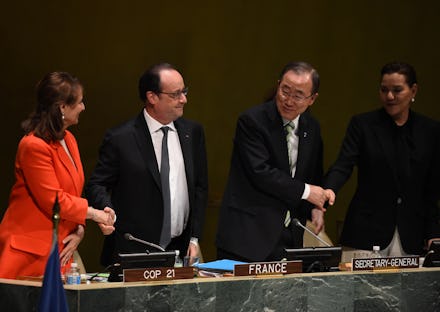Over 160 Countries Just Signed the Historic Paris Agreement on Climate Change

More than 160 countries convened Friday morning at the U.N. headquarters in New York City to sign the record-breaking Paris Agreement, a U.N.-led international consensus on how to tackle climate change.
The Paris Agreement is the result of the annual United Nations Conference on Climate Change, better known as Conference of the Parties or COP21, gathering in France in December. The event included world leaders and other major actors, who met with the intention of preventing the global temperature from rising by more than 2 degrees in less than 100 years, by 2100. The current trajectory of carbon emissions would likely mean the rise in temperature would exceed 2 degrees; thus far, the international community has been unable to agree on a plan of action that would prevent this from happening.
Read more: Climate Change Is Bad News for Polar Bears, Manhattan, All of Humanity — And Now Winos
"In the past it was about arriving at an agreement that would then be implemented, but this one's about implementation first and then the agreement follows," Reid Detchon, United Nations Foundation vice president for energy and climate strategy, said Wednesday in a phone interview. He called the agreement unprecedented in scope.
"Each nation came forward with a commitment to act and it became a robust package," Detchon said. "Putting that step ahead of the agreement instead of after saved two to three years based on individual goals."
But the optimism of others is more tempered, with many activists pointing to the non-binding status of the agreement as a major weakness. Savvy gestures that have generated publicity for the U.N., such as offsetting the heads of states' and delegates' travel carbon emissions — from their home bases to U.N. headquarters in New York — with Certified Emission Reductions, are being dismissed as mere optics by critics.
"The very idea of a voluntary framework is a sham," Andreas Malm of Jacobin wrote in November. "It has been argued that if commitments are non-binding and free, countries are likely to sign up for more. That is a bit like saying that if the spouses agree on their freedom to sleep with anyone, they are more likely to stay faithful — or if bankers can choose whether to pay taxes or not, more of them will."
And even if all the participating countries do actually adhere to their commitments, it's still not enough to prevent the world from heating up more than 2 degrees. Various studies on possible outcomes suggest the conditions under the Paris Agreement would still likely increase global temperatures by 2.7 to 3.7 degrees Celsius.
However, Detchon is confident the nature of the non-binding agreement will not undermine its success.
"There's no external forcing function here except peer pressure," he said. "Let's take India for example: They're a leading advocate of the idea that rich countries should pay for the damage they did. Yet they also came forward with a very robust package, which is very consistent with Prime Minister Modi's vision of how India should develop its economy.
"There's been a real psychological shift, seeing this as a shared burden and now also as an opportunity for development."